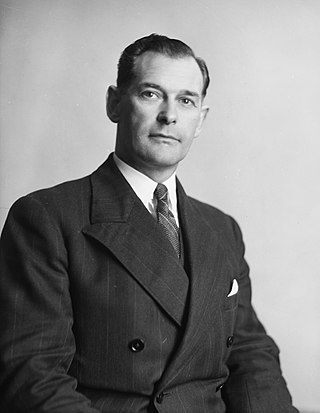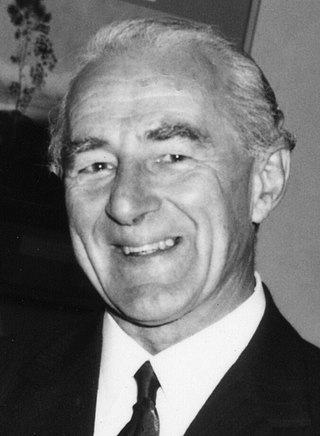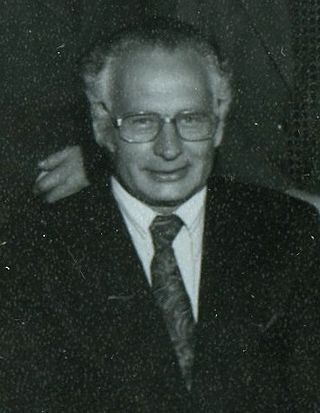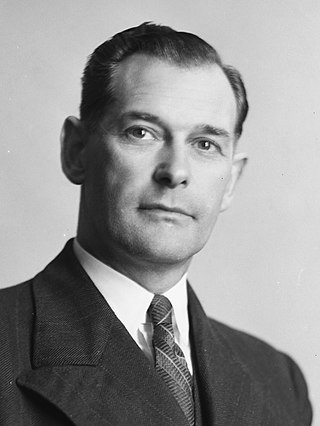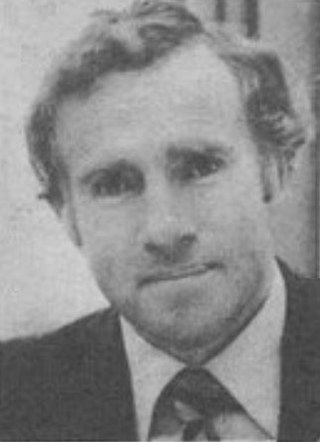New Zealand Parliament
Dean Eyre | |||||
|---|---|---|---|---|---|
 | |||||
| 9th New Zealand High Commissioner to Canada | |||||
| In office 7 December 1976 –15 January 1980 | |||||
| Years | Term | Electorate | Party | ||
| 1949 –1951 | 29th | North Shore | National | ||
| 1951 –1954 | 30th | North Shore | National | ||
| 1954 –1957 | 31st | North Shore | National | ||
| 1957 –1960 | 32nd | North Shore | National | ||
| 1960 –1963 | 33rd | North Shore | National | ||
| 1963 –1966 | 34th | North Shore | National | ||
Before leaving New Zealand Eyre had joined the National Party and had impressed party officials. In 1949 he was selected to contest the Labour held seat of North Shore. To National organisers surprise, and in spite of his support for an Auckland harbour bridge paid for by tolls, he won the seat. [2] He represented the North Shore seat from the 29th to 34th parliaments until 1966, when he retired. [4] He was a liberal within the National Party and, alongside Tamaki MP Eric Halstead, he supported the alternative drainage scheme in Auckland proposed by Dove-Myer Robinson. [5]
He served as a cabinet minister, initially under Sidney Holland as Minister of Industries and Commerce and Minister of Customs from 1954 to 1956. [6] In February 1956, Holland announced that Eyre had been granted six weeks leave in order to attend to private business in Sweden. The Leader of the Opposition, Walter Nash, was critical of the decision. Nash questioned the appropriateness of a minister of the crown conducting his private business abroad. Holland was quick to dismiss any suggestion of impropriety, but was soon to swallow his words. Both The Evening Post and The Dominion (Wellington papers who normally wrote editorials slanted in favour of National) also went on the attack in editorials, urging Holland to reconsider. A surprised Holland reacted quickly and Eyre was forced to cancel his trip, and was stripped of his portfolios and given to Eric Halstead. To ease the situation, Eyre was allocated Halstead's portfolios instead. [2] From 1956 to 1957 he served as Minister for Social Security and Minister of Tourist and Health Resorts. He was later given the additional roles of Minister of Housing and Minister of Police (1956–1957). [7] In Keith Holyoake's first ministry in 1957, he carried on as Minister of Housing, and became Minister of Defence. [8] From 1957 to 1960, while National was in opposition, he remained on the front bench and was Shadow Minister of Defence and Housing. [9]

In Holyoake's second ministry, he was again Minister of Defence (1960–1966), [10] and Minister of Housing (1960–1963), [11] and was Minister of Tourism (1963–1966). [12] Under Holyoake's government, New Zealand decided to join the contentious United States led Vietnam War. Auckland newspaper The New Zealand Herald reported that on 23 November 1966, Eyre had responded to an election meeting question in Devonport that his personal solution to end the war in Vietnam was to drop "a basin full of bombs" on the enemy. Leader of the Opposition, Norman Kirk, took advantage of the Herald article as the war was a large issue at the 1966 election. [2] Eyre claimed the reporting was not contextually related to his comments about military targets and he successfully sued for defamation over the reporting of the remark. [13] He sought $50,000 in damages from the Herald, and $50,000 each from its publisher Wilson and Horton and from the New Zealand Press Association. He won, and in March 1968 was awarded $15,000 from them and later an undisclosed amount from The Dominion. Soon afterwards, at a social function Eyre bumped in to Kirk where Kirk said he was anticipating also being in line for a damages claim. Eyre affirmed this and told Kirk "You can't afford it." To avoid litigation an apology was drafted and published by Kirk. [2]
He was then High Commissioner to Canada from 1968 to 1973. He would have gone to London instead of Ottawa if he had not been involved in the misreporting incident at the 1966 election campaign. [14] When his first three-year term as high commissioner was close to ending in 1972, Kirk, by then prime minister, signed off on an extension of Eyre's term. He was viewed as a solid performer in the role despite it not regarded as a difficult one. [2] He believed Robert Muldoon's leadership was the cause for National's fall of support comparative to the 1960s and thought the Muldoon government cabinet was weaker than previous National cabinets. [3]
He served a second period as High Commissioner to Canada from 1976 to 1980. After the completion of his second term he and his wife decided to remain in Canada. They decided to stay on because his sons and their families were both living there, and it was closer to the United Kingdom where his daughter was living, making it easier for he and his wife to visit her. [2]
